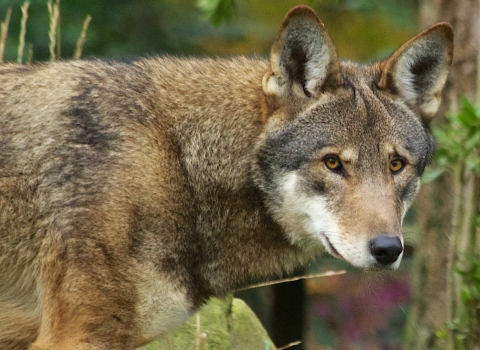The U.S. Fish and Wildlife Service is proposing to list Navasota false foxglove, a rare annual plant native to Southeast Texas, as endangered under the Endangered Species Act (ESA). The proposal also includes designating three units of critical habitat totaling 1.9 acres in Grimes and Tyler counties.
“Navasota false foxglove is very rare, with only a few known populations documented on a combined area of less than two acres in Southeast Texas,” said Amy Lueders, the Service’s Southwest Regional Director. “Small, isolated populations of rare species are vulnerable to catastrophic losses, and a single event could reduce the plant’s range by up to 50 percent. After assessing the best available information, the Service has determined that Navasota false foxglove is in danger of extinction throughout all of its range.”
Navasota false foxglove is a hemiparasitic annual plant known in only Grimes and Tyler counties. It is often tinged with purple, maroon, or bronze and blooms from mid-September to October. The species’ needs include chalky sandy to clay loam soils, pollinators, host plants to aid in germination, and open prairie habitat with full sun, adequate precipitation and no woody encroachment.
The main threats to Navasota false foxglove include encroachment of woody vegetation, competition from non-native grasses, climate change climate change
Climate change includes both global warming driven by human-induced emissions of greenhouse gases and the resulting large-scale shifts in weather patterns. Though there have been previous periods of climatic change, since the mid-20th century humans have had an unprecedented impact on Earth's climate system and caused change on a global scale.
Learn more about climate change and drought, and consequences resulting from limited numbers of individuals and isolated populations of the species.
Critical habitat identifies geographic areas containing features essential for the conservation of a threatened or endangered species, and which may require special management considerations or protection. The three proposed critical habitat units, totaling 1.9 acres, are all occupied by the species and under private ownership.
The benefits of critical habitat include public awareness of the presence of Navasota false foxglove and the importance of habitat protection. Federal agencies that undertake, fund, or permit activities that may affect the species’ critical habitat would be required to consult with the Service to ensure such actions do not adversely modify or destroy designated critical habitat.
The Navasota false foxglove proposed listing and critical habitat are based on the best available science, including a recently completed species status assessment that included input and review from academia and state agencies.
The proposal to list Navasota false foxglove as endangered and designate critical habitat will publish in the Federal Register on June 13, 2023 and public comments will be accepted until August 14, 2023.
The Service encourages the public, academia, federal and state agencies, industry and other stakeholders to review the proposal and provide comments electronically or by hard copy to: Public Comments Processing, Attn: [FWS-R2-ES-2022-0156] U.S. Fish and Wildlife Service, MS: PRB/3W, 5275 Leesburg Pike, Falls Church, VA 22041–3803.


